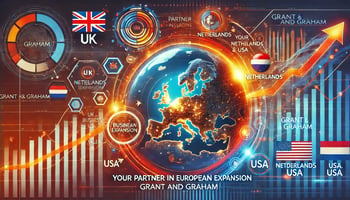Expanding into continental Europe is a strategic move that requires expert guidance and a...
How Dutch Businesses Are Adapting to Technological and Sustainable Changes
![]() The Netherlands has always stood at the crossroads of global trade and innovation. Its unique geography, rich history of entrepreneurship, and openness to new ideas have made it a natural hub for business activity. But today, the Dutch business landscape is experiencing shifts that go beyond the traditional pillars of agriculture, logistics, and industry. Technological advances, growing environmental awareness, and an increasingly interconnected global economy are redefining how business is done. For companies looking to remain competitive, understanding these changes is no longer optional—it’s essential.
The Netherlands has always stood at the crossroads of global trade and innovation. Its unique geography, rich history of entrepreneurship, and openness to new ideas have made it a natural hub for business activity. But today, the Dutch business landscape is experiencing shifts that go beyond the traditional pillars of agriculture, logistics, and industry. Technological advances, growing environmental awareness, and an increasingly interconnected global economy are redefining how business is done. For companies looking to remain competitive, understanding these changes is no longer optional—it’s essential.
The Rise of Tech-Driven Industries
Technology is at the heart of the Netherlands’ economic transformation. The country’s vibrant startup ecosystem, centered around hubs like Amsterdam, Rotterdam, and Eindhoven, is producing cutting-edge solutions in fields such as artificial intelligence, blockchain, and renewable energy. These innovations aren’t just disrupting existing markets; they’re creating entirely new sectors.
For example, Dutch companies are using artificial intelligence to optimize supply chains, enhance customer service, and predict market trends with greater accuracy. Blockchain technology is being adopted for secure transactions, transparent supply chains, and efficient cross-border trade. At the same time, the Internet of Things (IoT) is connecting devices and systems, improving everything from urban infrastructure to smart agriculture. This wave of tech-driven innovation is enabling businesses to do more with less, positioning the Netherlands as a global leader in digital transformation.
A Shift Toward Sustainability
Sustainability has moved from being a corporate buzzword to a critical business priority. Dutch companies are taking bold steps to reduce their carbon footprints, embrace circular economy principles, and integrate renewable energy sources into their operations. This shift isn’t merely about regulatory compliance or corporate responsibility—it’s a strategic decision.
Businesses that prioritize sustainability are finding that consumers, investors, and partners are more likely to engage with them. By adopting sustainable practices, companies in the Netherlands are future-proofing their operations, reducing long-term costs, and securing a competitive edge. Initiatives like the Dutch Climate Agreement and the European Union’s Green Deal further underscore the importance of sustainable business practices, providing clear targets and incentives for companies to innovate and adapt.
The New Dynamics of Global Trade
The Netherlands has always been a gateway to Europe, thanks to its strategic location, world-class ports, and strong international trade networks. But global trade itself is changing. Supply chain disruptions, shifting geopolitical alliances, and the rise of regional trade agreements are altering the landscape.
Dutch companies are responding by diversifying their supply chains, leveraging technology to increase transparency, and seeking out new markets. Digital trade platforms, advanced logistics solutions, and data-driven decision-making are helping businesses maintain their competitive edge in an increasingly complex global economy.
A Collaborative Culture
One of the most distinctive features of the Dutch approach to business is its culture of collaboration. Public-private partnerships are common, with companies, universities, and government bodies working together to tackle shared challenges. This cooperative spirit not only drives innovation but also ensures that solutions are practical, scalable, and widely adopted.
Examples abound: consortia developing green hydrogen technologies, academic partnerships advancing quantum computing, and regional initiatives focused on smart cities. By pooling resources and expertise, Dutch businesses are able to punch above their weight on the global stage.
A Changing Workforce and New Ways of Working
Finally, the Dutch business landscape is being shaped by changing workforce dynamics. Remote work, flexible schedules, and the growing importance of work-life balance are driving companies to rethink traditional workplace structures. This cultural shift is supported by strong digital infrastructure, progressive labor policies, and a focus on employee well-being.
As a result, companies that embrace these new ways of working are finding it easier to attract and retain talent. They’re also benefiting from higher productivity, greater employee satisfaction, and a more innovative company culture.
Looking Ahead
The Dutch business environment is evolving rapidly, presenting both challenges and opportunities. For companies that understand these trends and adapt to them, the future holds tremendous promise. By leveraging technology, prioritizing sustainability, embracing collaboration, and rethinking how and where work gets done, businesses in the Netherlands can navigate this period of change and emerge stronger than ever.
About Grant and Graham
At Grant and Graham, we believe in helping businesses stay ahead of the curve. As the Netherlands continues to transform, we’re here to guide you through the complexities, offering insights, strategies, and solutions tailored to your unique needs. Learn more about how we can help at www.grant-graham.co.uk.



